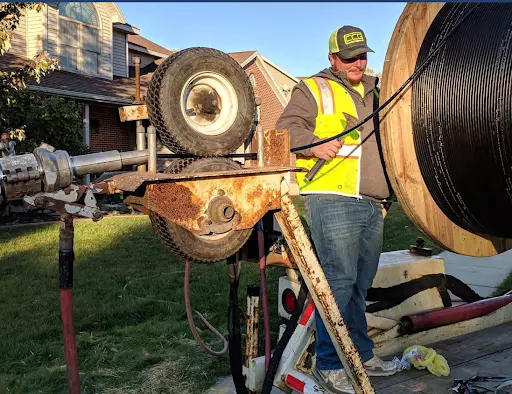The value of OpenFSM
In the last two years, the Public has gained new appreciation for how important effective Field Services Management is in industries ranging from Telecom, Home Services, Construction, Utilities and more. People and businesses greatly appreciate (and are willing to pay extra for) on-time installations, scheduled maintenance, and effective emergency repair or other services.
OpenFSM’s flexible services management tools help companies better manage their fleets and technicians, providing real-time visibility into availability and workload, inventory stored within the fleet, skills and certifications and more. Technicians, using the Mobile client, can easily see their scheduled job, and manage installations, maintenance and fixes with the Dispatching office in real time. Using OpenFSM, your team is more likely to dispatch the right resources to the right job, with predictability and efficiency.
It is surprising from our perspective to see how many organizations still use a combination of manual and outdated processes for managing Field Services. Common problems include limited or no awareness of the inventory or tools issued to a specific service vehicle, mismatched skills or credentials for the specific job, or unexpected break/fix incidents that need immediate attention.
Your typical FSM operation in action
Let’s imagine a telecom installing or repairing fiber optic lines in a neighborhood.

This sort of work requires several trucks to haul tools ranging from fiber bonding crimpers, small and medium trenchers, as well as the fiber itself. Teams generally include 3-4 well trained technicians, as well as possible junior staff, or utility location teams.
The cost of “closed” FSM
Let’s also estimate the cost per hour for operating this staff. We will assume that our company owns its own vehicles, but might be renting trenchers or other tools.
We are also going to assume that we can complete one new service each hour:
| Category | Unit cost | Total |
|---|---|---|
| Cost of Technicians/hour | $50/each x 4 | $200 |
| Fuel costs, driving and operating | $25 | $25 |
| Tool rentals | $75/hour | $75 |
| Totals | $300/hour |
Based on this, we know that each new service will cost us $300. (This doesn’t include materials, permits or other sorts of costs).
Let’s assume as well that we forgot to bring our splicing tools with us one day– and that we are 60 minutes from the office, and we don’t know where any of the other crews are at.
| Category | Unit cost | Total |
|---|---|---|
| Cost of Technicians/hour | $50/each x 4 | $200 |
| Fuel costs, driving and operating | $25 | $25 |
| Tool rentals | $75/hour | $75 |
| Extra Travel and waste | $300 x 3 | |
| Total | $900 |
Unfortunately, we have just tripled the costs of completing this job. Since Telecom is a “long tail” sort of business, we have broken the profitability model, as well as likely irritating this Customer and others waiting for their service appointments later today.
These sorts of scenarios are all too common in many trades. Whether it is plumbing, HVAC, electrical or other services, Technicians everywhere have regular horror stories about equipment that was supposed to be prepositioned, customers that could not provide access, or tools or supplies that were supposed to be on the truck.
OpenFSM offers cost-effective solutions
OpenFSM provides tools to solve these problems. OpenFSM manages supply inventories on each truck, tool scheduling, technician certifications, and routing, as well as providing real time communication via our exclusive Mobile application.
Let’s change the trade up a bit, and see what a residential plumbing company can do with better FSM tools.

We will assume that this plumbing company handles typical calls of clogged lines, pipe repairs, excavations, and new services, but, because they are located in the Phoenix area (notorious for bad water), they specialize in hot water heater replacements.
Let’s also estimate the cost per hour for operating this staff. We will continue to assume that our company owns its own vehicles.
We are also going to assume that we can replace a hot water heater in two hours.
| Category | Unit cost | Total |
|---|---|---|
| Cost of Technicians/hour | $50/each | $100 |
| Fuel costs, driving and operating | $25 | $25 |
| High grade hot water heater | $500 | $500 |
| Totals | $625 |
Lastly, we will assume that we will charge $1000 for a “White Glove” water heater replacement, including disposal of the old heater. This would net our Plumbing company $375 per service call, or assuming an 8 hour work day (including lunch breaks, hardware store stops, etc), 3.5 jobs, or $1,312.50 in gross profit, per technician, per day. Assuming this technician works 210 days/year, we would expect to see $275,625 in gross profits.
Now, let’s assume that we can improve the operations in a few ways:
- Better inventory awareness of the water heaters stored in each van.
- Better inventory management of fittings, valves and pipes in each van.
- Better matching skills and geography to each technician.
- Less waste from poor dispatching, and better resiliency when problems arise.
In this case, with no increase in working hours, we think that each technician can replace 4 water heaters a day, on average. This would still net our Plumbing company $375 per service call, and $1,500 in gross profit, per technician, per day. Assuming this technician works 210 days/year, we would expect to see $315,000 in gross profit, or almost $40,000/year in improved profitability.
OpenFSM offers these sorts of efficiency and productivity gains today, and is proven in multiple companies and industries, ranging from water delivery, to telecommunications, to pest control.





